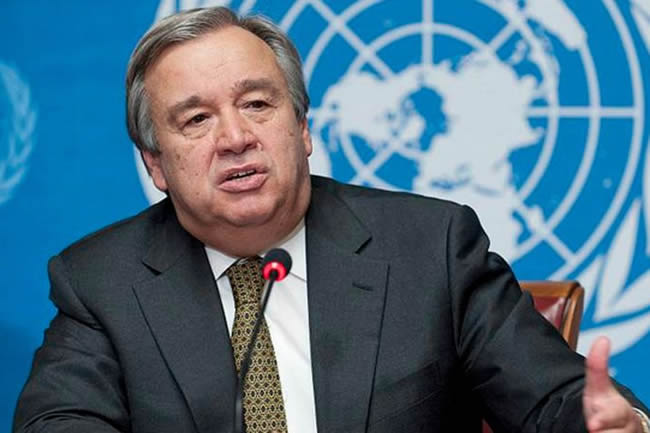
The international community pledged $1.5 billion Monday toward tackling the massive humanitarian crisis in Sudan, as fighting between forces led by rival generals has only been punctuated by brief truces and no political solution appears close at hand.
“The scale and speed of Sudan’s descent into death and destruction is unprecedented,” U.N. Secretary-General Antonio Guterres told the conference. “Without strong international support, Sudan could quickly become a locus of lawlessness, radiating insecurity across the region.”
Since fighting between the Sudanese army and paramilitary Rapid Support Forces erupted on April 15, thousands of civilians have been killed and injured and 2.1 million people have fled the fighting. Nearly half a million have crossed into neighboring countries.
“The situation in Darfur and Khartoum is catastrophic,” Guterres added. “Fighting is raging with people attacked in their homes and on the street.”
He said the only way to end the crisis is through a return to peace and the restoration of civilian rule through the transition to democracy.
But until a meaningful dialogue is opened and a sustainable cease-fire is achieved, humanitarians are trying to assist the nearly 25 million people in need in Sudan and in neighboring countries. They are hampered by insecurity on the ground, bureaucracy holding up visas and travel permits, and perhaps most importantly, a lack of cash.
U.N. humanitarian chief Martin Griffiths said aid workers are having “extraordinary difficulties” reaching the 8.6 million people in Darfur who need humanitarian aid and protection.
“To expand access to people in all areas and to increase the flow of aid, we are actively exploring all modalities – including cross-border operations,” he told donors.
He also warned that the coming planting season is in jeopardy if seeds from the U.N. Food and Agriculture Organization do not reach farmers. He said this could further complicate the food security situation. Malnutrition is already on the rise in Darfur.
Separately, the International Committee of the Red Cross warned that only about 20% of the medical facilities in the capital, Khartoum, are still functioning, and Sudan’s other essential services are under tremendous strain.
Despite these obstacles, the U.N. and its partners have reached 1.8 million people with aid since the fighting started.
The pledging conference in Geneva was co-hosted by the United Nations with Egypt, Germany, Qatar, Saudi Arabia, the African Union and the European Union; more than 80 governments and organizations participated.
Until Monday, of the $3 billion needed, less than 17% had been received. Griffiths said the $1.5 billion pledged would be “a lifeline for millions of people living in the world’s most dangerous and difficult conditions.”
Some of the $1.5 billion total includes funds pledged before Monday’s donor event, however, several significant new pledges were made, including $171 million in new contributions from the United States, bringing to $550 million its overall contributions this fiscal year to the situation. Germany announced $219 million, and Qatar announced $15 million on top of the $100 million it has already contributed. The United Nations announced an additional $22 million from its own emergency fund.
Source: voanews.com























